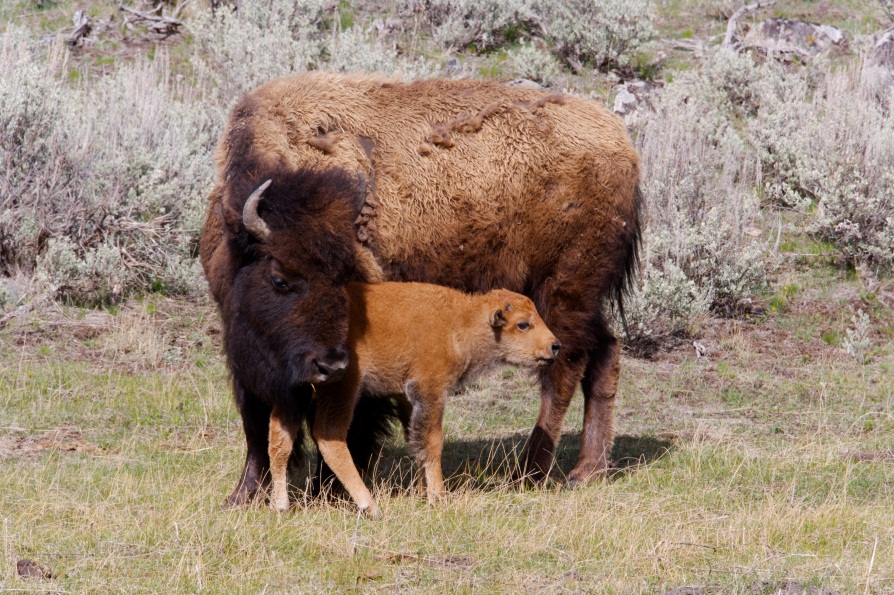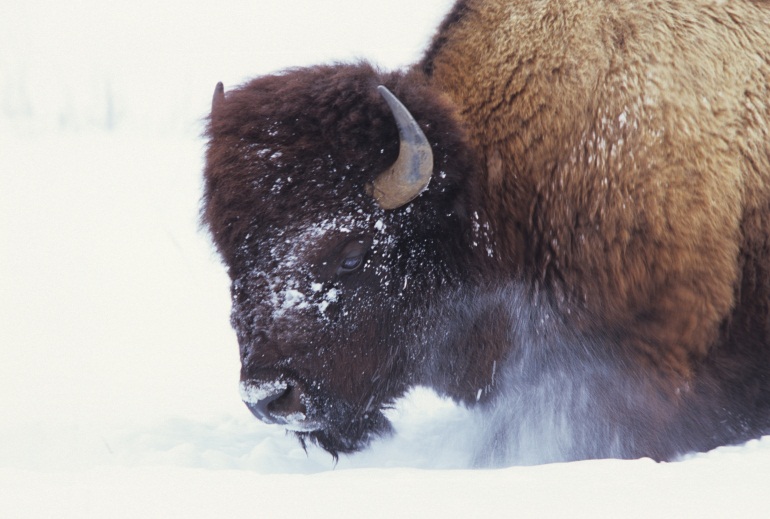Bison Study Launch
Bison study launch rev 3_13_14.doc
Bison 2014 Study
Bison Study Launch
OMB: 0579-0420
![]()
Veterinary Services
Centers for Epidemiology and Animal Health April 2014
_________________________________________________________________________________________________________________________
National Animal Health Monitoring System to Study Ranched Bison in 2014
The first national study of the U.S. ranched bison industry is scheduled to begin in August 2014. The study is being conducted by the USDA’s National Animal Health Monitoring System (NAHMS), with assistance from the National Agricultural Statistics Service (NASS). With this study, NAHMS, a unit within the USDA’s Animal and Plant Health Inspection Service (APHIS), seeks to increase knowledge and understanding about the characteristics, health and management practices, and challenges of bison operations in the United States.
Study focus
Bison 2014 is being conducted as a result of discussions between APHIS and representatives of the U.S. bison industry. To define the most critical information needs of the industry, NAHMS obtained input from bison producers. The Bison 2014 study has the following objectives:
Provide a baseline description of the U.S. bison industry, including basic characteristics of operations, such as inventory, size, and type.
Describe current U.S. bison industry production practices and challenges, including identification, confinement and handling, animal care, and disease testing.
Describe health management and biosecurity practices important for the productivity and health of ranched bison.
Describe producer-reported occurrence of select health problems and evaluate potentially associated risk factors.
“The
bison business is a rapidly growing part of the livestock sector.
Our continued growth depends in large part on making sure that
producers have the knowledge and resources needed to keep their
herds healthy. The partnership with NAHMS is a tremendous asset for
industry. The National Bison Association encourages full
participation by producers throughout our industry.”
—Dave
Carter
Executive
Director
National
Bison Association
How you can help
By participating in Bison 2014, you will help the industry and your own operation by contributing to the development of reliable and accurate information about important issues of U.S. bison operations. This information will have many uses, including the following:
Assisting university researchers, extension agents, producer groups, and others in identifying and focusing educational and research efforts on vital issues related to U.S. bison operations.
Assisting animal health officials, policy-makers, and industry members in making informed decisions to help protect U.S. agriculture and animal health.

Photograph courtesy of Matthew S. Patyk
What your participation involves
Participation in the Bison 2014 study is voluntary and confidential. All U.S. operations with ranched bison are eligible to participate. NASS will draw a random sample of bison producers based on its 2012 U.S. Census of Agriculture.
If you are selected by NASS to participate in the study, you can expect the following schedule.
In August 2014, NASS will send you a questionnaire and materials describing the study, along with a prepaid return envelope.
At your convenience, please complete the questionnaire and return it to NAHMS within the study timeframe, as indicated in the study instructions.
How you and the industry will benefit
Individual producers and the U.S. bison industry will benefit from a variety of in-depth reports and information sheets that will describe the current management, health, and productivity of the industry. These publications will enable producers to compare their operations—including management decisions and practices—with other bison operations. Current and scientifically valid estimates of general management and health-related topics will be presented.
A scientific approach
APHIS established NAHMS to collect and report accurate and useful information on animal health and management in the United States. Since 1990, NAHMS has provided national estimates on disease prevalence and other factors related to the health of U.S. beef cattle, dairy cattle, swine, equine, poultry, aquaculture, sheep, and goat populations. The science-based results produced by NAHMS have proved to be of considerable value to the U.S. livestock, poultry, and aquaculture industries, as well as to other animal-health stakeholders.
NAHMS studies are
National in scope,
Science based,
Statistically valid,
Collaborative in nature,
Voluntary, and
Confidential.
“Bison
are built to survive—and to thrive—in this part of the
world. But they aren’t immune to some of the epidemiological
challenges such as M. bovis and MCF. They aren’t cattle, and
don’t respond like other livestock species to testing for
pathogens. The bison immune system doesn’t respond in the
same way as other livestock or wildlife species. The NAHMS Bison
2014 study can provide us with valuable species-specific
resources.”
—Dave
Hunter, DVM
Veterinarian,
Turner Enterprises, Inc.
Chair
National Bison Association Science and Research Committee
Confidentiality
NAHMS is a statistical unit under the Confidential Information Protection and Statistical Efficiency Act (CIPSEA). All information collected during the Bison 2014 study will be used for statistical purposes only and will be treated as confidential in accordance with CIPSEA guidelines. Bison 2014 results will be presented only in an aggregate manner.

Photograph courtesy of Matthew S. Patyk
“Because
of the size of our industry, we often lack access to resources
available to producers of the major livestock species. I will be
encouraging every producer in our business to participate in the
NAHMS bison study so that we can develop tools and resources that
will allow us to better manage our herds.”
—Peter
Cook
President, National Bison Association
Owner, Cooks
Bison Ranch, Wolcottville, IN
___________________________
For more information, contact:
USDA–APHIS–VS–CEAH–NAHMS
NRRC Building B, M.S. 2E7
2150 Centre Avenue
Fort Collins, CO 80526-8117
970.494.7000
http://www.aphis.usda.gov/nahms
#695.0414
___________________________
The U.S. Department of Agriculture (USDA) prohibits discrimination in all its programs and activities on the basis of race, color, national origin, age, disability, and where applicable, sex, marital status, familial status, parental status, religion, sexual orientation, genetic information, political beliefs, reprisal, or because all or part of an individual’s income is derived from any public assistance program. (Not all prohibited bases apply to all programs.) Persons with disabilities who require alternative means for communication of program information (Braille, large print, audiotape, etc.) should contact USDA’s TARGET Center at (202) 720–2600 (voice and TDD). To file a complaint of discrimination, write to USDA, Director, Office of Civil Rights, 1400 Independence Avenue, S.W., Washington, D.C. 20250–9410, or call (800) 795–3272 (voice) or (202) 720–6382 (TDD). USDA is an equal opportunity provider and employer.
Mention of companies or commercial products does not imply recommendation or endorsement by the U.S. Department of Agriculture over others not mentioned. USDA neither guarantees nor warrants the standard of any product mentioned. Product names are mentioned solely to report factually on available data and to provide specific information.
U nited
States Department of Agriculture • Animal and Plant
Health Inspection Service • Safeguarding
American Agriculture
nited
States Department of Agriculture • Animal and Plant
Health Inspection Service • Safeguarding
American Agriculture
| File Type | application/msword |
| Author | bdoty |
| Last Modified By | Parker, Margaret A - APHIS |
| File Modified | 2014-03-13 |
| File Created | 2014-03-13 |
© 2026 OMB.report | Privacy Policy